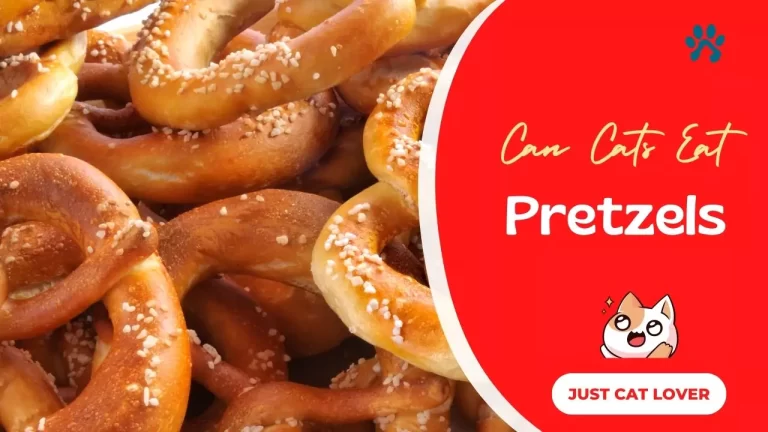No, cats should not eat pretzels. While an occasional small piece of a pretzel won’t cause any major issues for most cats, pretzels are not a nutritionally balanced food for felines and contain ingredients that can be harmful to cats if consumed in large amounts.
Nutritional Value of Pretzels
Pretzels are made using wheat, yeast, salt, butter, or oil. Pretzels don’t provide cats with the protein, fat, vitamins, and minerals they require.
Cats are obligate carnivores and must consume meat to receive the necessary amino acids. Pretzels are grain-based snacks with minimal nutritional value for cats. Cats need taurine, arginine, vitamin A, vitamin B12, niacin, and other nutrients, which they lack.
Over time, feeding cats only carbohydrates and no meat may cause malnutrition, weight loss, visual difficulties, heart disease, and other health concerns. So pretzels should be served rarely, not daily.
Do pretzels contain any ingredients that are toxic to cats?
Some pretzel components, particularly in significant doses, may harm cats.
- Salt: Too many pretzels may harm a cat. Salt poisoning causes vomiting, diarrhea, depression, tremors, high body temperature, seizures, and death.
- Xylitol: Some pretzel recipes swap sugar with xylitol. This sweetener is very poisonous to cats and may induce severe blood sugar drops and liver damage. Xylitol kills cats in little concentrations.
- Garlic and onion powder: These ingredients may flavor pretzels. Garlic and onions are poisonous to cats and may harm red blood cells, producing anemia at large dosages.
Thus, cats shouldn’t eat pretzels containing salt, xylitol, garlic, or onions. Review ingredient lists before sharing.
Health Risks of Pretzels for Cats
While the occasional pretzel won’t harm most cats, there are some health risks to be aware of:
- Choking hazard: Pretzels can present a choking risk for cats, especially kittens, older cats or any cats with dental disease. Hard pretzel chunks or pieces can become lodged in the esophagus, blocking the airway.
- Obesity: Pretzels are high in carbohydrates with little protein. A diet too high in carbs can lead to feline obesity and related issues like diabetes, arthritis and heart disease.
- Upset stomach: Too many pretzels may give some cats an upset stomach from the high salt, fat or carb content. Signs include vomiting, diarrhea, loss of appetite and gas.
- Allergies: Pretzels contain gluten, so cats with gluten allergies should not eat them. Food allergies also trigger itchy skin, ear infections, bald patches and other symptoms in some cats.
- Nutritional deficiencies: Relying on pretzels as a main food item can lead to malnutrition over time due to their lack of protein, vitamins and minerals.
So limit pretzel feeding to an occasional treat in small amounts. And avoid giving pretzels at all to kittens, older cats or those with medical issues.
Tips for Feeding Pretzels to Cats
If you want to share the occasional pretzel with your cat, follow these tips to reduce risks:
- Choose plain, unsalted soft pretzels to limit sodium content. Avoid seasoned, crunchy or hard pretzels which present more risks.
- Check the ingredients list and avoid pretzels with xylitol, garlic, onion or other additives that are toxic for cats.
- Only feed your cat small pieces of pretzel, about the size of the tip of their pinky claw. This helps prevent choking.
- Limit treats to no more than 10% of your cat’s daily calories. Feed pretzels sparingly, not on a regular basis.
- Introduce new foods slowly and watch for signs of allergies or tummy upset. Discontinue feeding if any issues arise.
- Make sure your cat always has access to fresh water to help dilute salt intake and prevent dehydration.
- Never give pretzels to kittens under 1 year old, elderly cats or those with medical conditions. These groups are at higher risk of problems.
Conclusion
Adult cats can handle an occasional pretzel. Pretzels have little nutritional benefit for cats and may be poisonous in large doses. Pretzels should be fed seldom. Stick to healthful delights like tiny portions of grilled chicken breast and a balanced meat-based diet. Avoid feeding kittens, senior cats, and sick cats pretzels. If you have concerns about feeding your cat pretzels or other human foods, see your vet.







